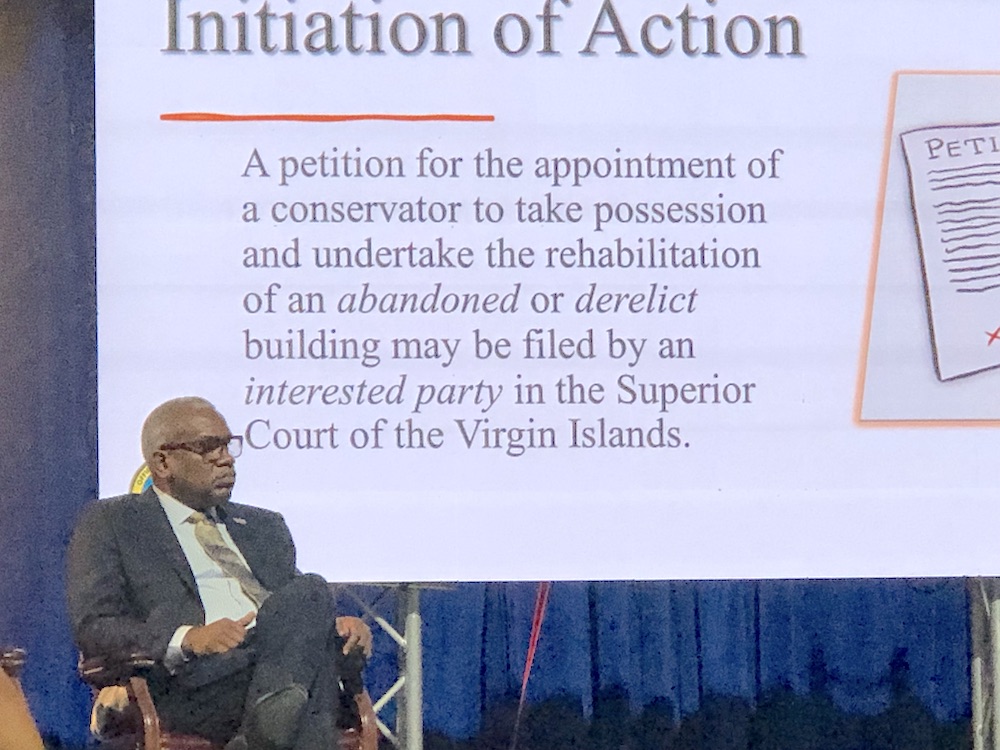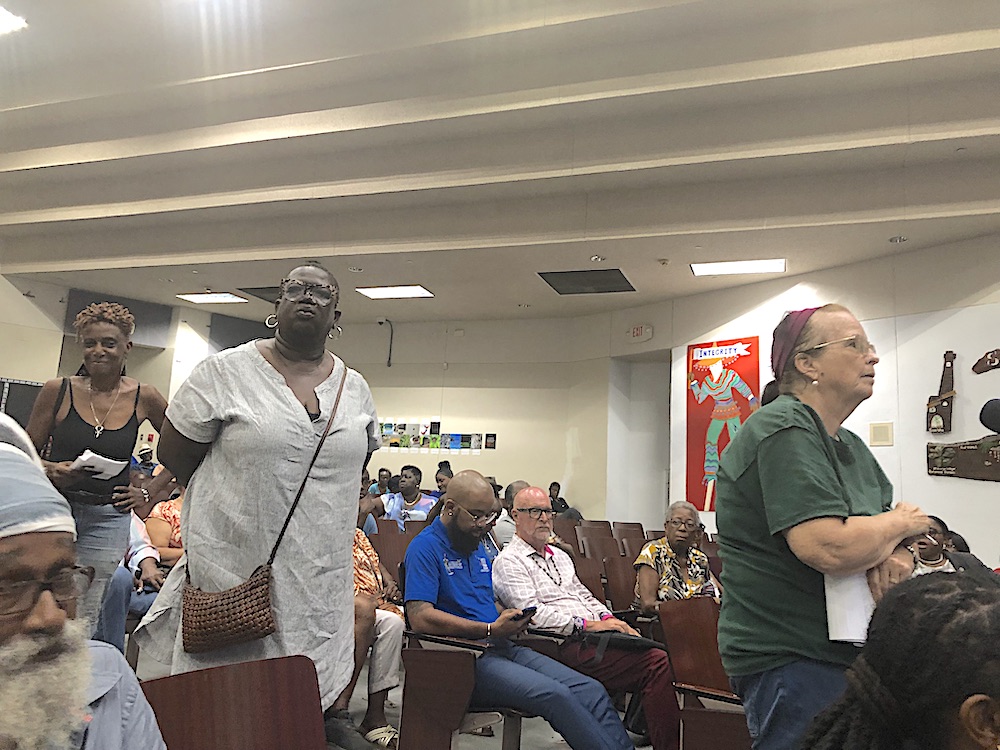
Gov. Albert Bryan Jr. and several staff members talked about a plan for dealing with the territory’s abandoned and derelict properties during a town hall meeting Wednesday at the St. Croix Educational Complex. A similar meeting was held Monday on St. Thomas.
Bryan said that before meeting with the public, the plan was discussed with government officials, members of the business community and individuals. He said, he and Karl Knight, his chief of staff, have been working on the problem for years but they are “not married” to any part of the plan.
“This is just a proposal for discussion,” he said.
This is a good time to approve a plan, according to the governor, because the government has $10 million in the Housing and Urban Development’s Community Development Block Grants for loans and grants to implement the final proposal.
The plan begins with the Superior Court declaring a building to be abandoned and/or derelict. Anyone – the owner, a lien holder, neighbor, an organization or the V.I. Government – can petition for a conservator to be appointed.
The conservator will be a pre-qualified non-profit organization, a government agency or a redevelopment authority (Knight said there are no redevelopment authorities in the territory at this time).
Knight talked the crowd through a slide show explaining the components of the governor’s plan. The building must meet the condition of first being abandoned – not occupied for five years – and then three of five other situations.
Either the building is a public nuisance, requires substantial rehabilitation, is a fire hazard, susceptible to unauthorized entry, attractive to children, or used for drug sales or vagrancy. Or the building could be filled with debris, vermin, overgrown, physically deteriorated or negatively impact the economic well-being of nearby residents or businesses.
“The blighted condition of the community is accelerating faster than in the past,” Knight said, especially after the 2017 hurricanes.
Once the conditions are met, the court appoints a conservator – the property owner may express his preference in selecting a conservator. Then the selected conservator makes a plan for rehabilitating or tearing down the property. The plan is then presented to the court.
Basically, the conservator has the same rights as the property owner has – to improve, maintain and manage the property, including contracting the repair and maintenance of the property and renting, leasing, or, with explicit approval of the owner, to sell the property.
“Nothing disposes the owner,” Knight said. “
The conservator and owner, if he wants to participate, select a developer to complete the plan, which is monitored by the court.
After the property has been renovated or demolished, the owner can decide whether to live in the building, sell or rent it. The conservatorship is then terminated.
“If we don’t do something soon, the whole town is going to fall apart,” Bryan said. “Yes, it’s scary, but you have to trust the people you elected.”
While explaining the plan he hopes to submit to the V.I. Legislature, Bryan responded to comments and questions, a few loud and disrespectful, resulting in one man being ejected from the auditorium by several V.I. Police Department personnel.
Most of the estimated 175 people attending the meeting were sincere and polite while discussing the problem of decaying and deserted properties in the towns and countryside on all Virgin Islands.

The first two people from the audience to speak asked about the blighted government buildings, such as the Whim Museum, the Danish Hospital in Frederiksted and St. Croix’s libraries. The governor said the Whim/Landmarks Society board needs to contract an architect to conform with FEMA requirements and construction on the libraries will soon begin.
Another participant asked about the abandoned Good Hope School, which is filled with trash, debris and even dead animals, she said. Bryan said the government is talking to the board about “taking it over.”
There were also audience questions about adding more judges to handle probate cases, to release the written draft legislation to the public and why the senior facility, Aldershville, is not being replaced. Bryan said Aldershville is not eligible for FEMA funding but he agreed the elderly need a place to convene.
Responding to another question, Bryan said the government may decide to defer property taxes during the renovations. He answered another question about neighboring property taxes that increase as a result of renovations. The neighbors’ property value will increase as well, he said, and V.I. law states property taxes can not increase more than 10 percent at a time.
A final comment at the end of the two-and-a-half-hour town hall came from Sen. Frankie Johnson, who suggested there should already be a task force in place to secure and protect the buildings to be considered for renovation.
Bryan and Knight said the existing plan will be adjusted to take into account the public response at the town hall meetings. The resulting document will be forwarded to those participating in the community hearings.


